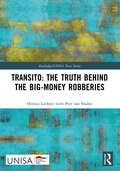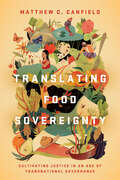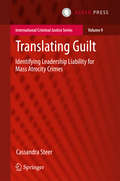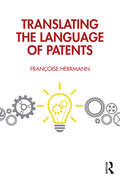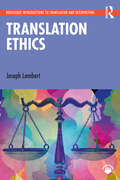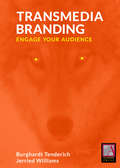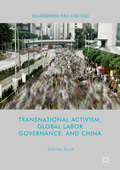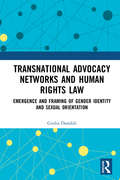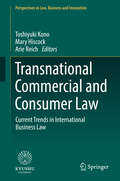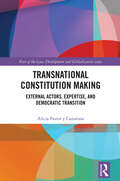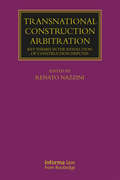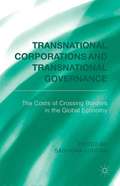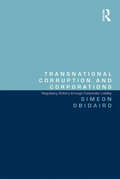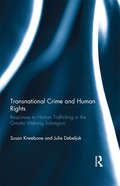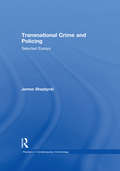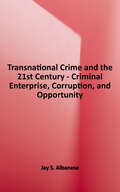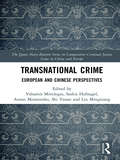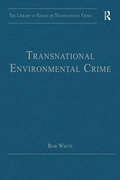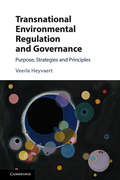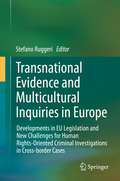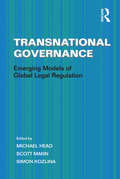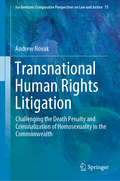- Table View
- List View
Transito: The Truth behind the Big-Money Robberies (Routledge/UNISA Press Series)
by Hennie Lochner Peet van StadenThis book is an important resource for the cash in transit (CIT) companies, financial services industries and criminal justice system. With one of the authors having used convicts of CIT crimes as participants for a PhD study, he solicited data from the lived experiences of CIT robbers that reveal their modus operandi, which is crucial to combat these robberies. The authors reveal how CIT robbers meticulously plan and execute their ambushes collaborating with the sophisticated network of accomplices. The book is thus a timely publication that provides information to combat CIT crimes.
Translating Food Sovereignty: Cultivating Justice in an Age of Transnational Governance
by Matthew C. CanfieldIn its current state, the global food system is socially and ecologically unsustainable: nearly two billion people are food insecure, and food systems are the number one contributor to climate change. While agro-industrial production is promoted as the solution to these problems, growing global "food sovereignty" movements are challenging this model by demanding local and democratic control over food systems. Translating Food Sovereignty accompanies activists based in the Pacific Northwest of the United States as they mobilize the claim of food sovereignty across local, regional, and global arenas of governance. In contrast to social movements that frame their claims through the language of human rights, food sovereignty activists are one of the first to have articulated themselves in relation to the neoliberal transnational order of networked governance. While this global regulatory framework emerged to deepen market logics, Matthew C. Canfield reveals how activists are leveraging this order to make more expansive social justice claims. This nuanced, deeply engaged ethnography illustrates how food sovereignty activists are cultivating new forms of transnational governance from the ground up.
Translating Guilt
by Cassandra SteerThis book seeks to understand how and why we should hold leaders responsible for the collective mass atrocities that are committed in times of conflict. It attempts to untangle the debates on modes of liability in international criminal law (ICL) that have become truly complex over the last twenty years, and to provide a way to identify the most appropriate model for leadership liability. A unique comparative theory of ICL is offered, which clarifies the way in which ICL develops as a patchwork of different domestic criminal law notions. This theory forms the basis for the comparison of some influential domestic criminal law systems, with a view to understanding the policy and cultural reasons for their differences. There is a particular focus on the background of the German law which has influenced the International Criminal Court so much recently. This helps to understand, and seek a solution to, the current impasses in the debates on which model of liability should be applied. An entire chapter of the book is devoted to considering why leaders should be held responsible for crimes committed by their subordinates, from legal, moral and pragmatic perspectives. The moral responsibility of leaders is translated into criminal liability, and the different domestic models of liability are translated to the international context, in such a way as to appeal to advanced students of ICL, academics, and practitioners who want to understand the complexities of leadership liability in international criminal law today and identify the best way to approach it. Cassandra Steer is Executive Director of Women in International Security Canada, and Junior Wainwright Fellow at McGill University, Canada. She holds a Ph. D. in Law from the University of Amsterdam, The Netherlands.
Translating the Language of Patents
by Françoise HerrmannThis book is a guide to translating the language of patents in view of avoiding costly translation errors. Errors that might hinder the examination process for granting patents, or that might make patents undefendable in a context of litigation.The 42 sections of this book each identify different provisions of the law for their relevance to translation. These provisions govern language uses, right down to the use of punctuation. Each of the sections present findings, both in terms of the relevant provisions identified, and their specific significance to translation. Exemplified translations focus on French and English, but when there is a consensus across Intellectual property systems, multilingual parallelism is highlighted. Wherever relevant, provisions of specific rules and regulations are presented and exemplified in the three official languages of the European Patent Office (EPO), English, French, and German and the three official languages of the United Nations World Intellectual Property Organization (WIPO), English, French, and Spanish.Written by an experienced teacher, patent translator, and author of the blog, Patents on the Soles of Your Shoes, this is a rigorously researched, authoritative, and comprehensive guide for all professional translators working on patents, and for students and translators working in legal translation. Accompanying e-resources are available on the Routledge Translation studies portal (routledgetranslationstudiesportal.com) including information on how to use this book in courses.
Translation Ethics (Routledge Introductions to Translation and Interpreting)
by Joseph LambertTranslation Ethics introduces the topic of ethics for students, researchers, and professional translators. Based on a successful course and written by an experienced instructor, the Introduction and nine core chapters offer an accessible examination of a wide range of interlocking topic areas, which combine to form a cohesive whole, guiding students through the key debates. Built upon a theoretical background founded in philosophy and moral theory, it outlines the main contributions in the area and traces the development of thought on ethics from absolutism to relativism, or, from staunchly-argued textual viewpoints to current lines of thought placing the translator as agent and an active – even interventionary – mediator. The textbook then examines the place of ethical enquiry in the context of professional translation, critiquing provision such as codes of ethics. Each chapter includes key discussion points, suggested topics for essays, presentations, or in-class debates, and an array of contextualised examples and case studies. Additional resources, including videos, weblinks, online activities, and PowerPoint slide presentations on the Routledge Translation studies portal provide valuable extra pedagogical support. This wide-ranging and accessible textbook has been carefully designed to be key reading for a wide range of courses, including distance-learning courses, from translation and interpreting ethics to translation theory and practice.
Transmedia Branding: Engage Your Audience
by Larry Gross Arlene Luck Burghardt Tenderich Jerried WilliamsYou're either fully engaged with your audience or you're irrelevant. The choice is yours.What do Chipotle and The Matrix and Intel and Old Spice and The Teenage Mutant Ninja Turtles know that you don't? How have disruptive economics, consumerism, and spreadable media evolved the relationship between brands and their audiences?We've all heard it before -- decreased barriers to entry, increased accessibility to technology, and the ability to virtually connect with experts around the globe have ignited a fiercely competitive battle for eyeballs. In this crowded media environment, how can brands create campaigns that people want to engage with and share with others? What mistakes do they need to avoid?In Transmedia Branding: Engage Your Audience, Burghardt Tenderich and Jerried Williams traverse the entertainment industry, technology sector, and consumer goods to show the timeless relevance of some of the greatest minds in communications: David Ogilvy, Edward Bernays, Philip Kotler, and Henry Jenkins. They provide a methodology for developing transmedia branding campaigns to engage audiences along with multiple case studies for further insight.The book targets marketing and public relations practitioners, students, academics and anybody interested in the rapidly evolving world of marketing communications and public relations.
Transnational Activism, Global Labor Governance, and China
by Sabrina ZajakThis book explores rising labor unrest in China as it integrates into the global political economy. The book highlights the tensions present between China's efforts to internationalize and accept claims to respect freedom of association rights, and its continuing insistence on a restrictive, and often punitive, approach to worker organizations. The author examines how the global labor movement can support the improvement of working conditions in Chinese factories. The book presents a novel multi-level approach capturing how trade unions and labor rights NGOs have mobilized along different pathways while attempting to influence labor standards in Chinese supply chains since 1989: within the ILO, within the European Union, leveraging global brands or directly supporting domestic labor rights NGOs. Based on extensive fieldwork in Europe, the US and China, the book shows that activists, by operating at multiple scales, were on some occasions able to support improvements over time. It also indicates how a politically and economically strong state such as China can affect transnational labor activism, by directly and indirectly undermining the opportunities that organized civil societies have to participate in the evolving global labor governance architecture.
Transnational Actors in International Investment Law (European Yearbook of International Economic Law)
by Anastasios GourgourinisThis book reviews for the first time some of the less frequently addressed actors in international investment law. Traditional studies concerning actors in international investment law have tended to focus on arbitrators, claimant investors and respondent states. This book explores transnational actors, such as UNCITRAL, the EU, international standardizing bodies, domestic and international courts and tribunals, etc., shedding light on their transnational activity and pluralistic role in international investment law.
Transnational Advocacy Networks and Human Rights Law: Emergence and Framing of Gender Identity and Sexual Orientation
by Giulia DondoliThis book asks the fundamental question of how new human rights issues emerge in the human rights debate. To answer this, the book focuses on nongovernmental organizations (NGOs) and on the case study of LGBTI (lesbian, gay, bisexual, transgender and intersex) rights. The work argues that the way in which NGOs decide their advocacy, conceptualise human rights violations and strategically present legal analysis to advance LGBTI human rights shapes the human rights debate. To demonstrate this, the book analyses three data sets: NGO written statements submitted to the United Nations Human Rights Council, NGO oral statements delivered during the Universal Periodic Review and 36 semi-structured interviews with NGO staff. Data are analysed with a combination of quantitative and qualitative approaches to discover what issues are most important for LGBTI networks (issue emergence) and how these issues are framed (issue framing). Along with NGO efficiency in lobbying for the emergence of new human rights standards, the book inevitably discusses important questions related to NGOs’ accountability and democratic legitimacy. The book thus asks whether the right to marry is important for LGBTI advocates working transnationally, because this right is particularly controversial among activists and LGBTI communities, especially in non-Western contexts.
Transnational Commercial and Consumer Law: Current Trends In International Business Law (Perspectives in Law, Business and Innovation)
by Toshiyuki Kono Mary Hiscock Arie ReichThis book explores current developments in transnational commercial and consumer law. It features essays written by leading experts, many of who have taken part in the negotiation and formulation of the international instruments they discuss here. The contributors look at issues arising from the profound changes that globalization is having on the legal norms governing commercial and consumer transactions, both domestic and transnational. They consider how relations between private actors, state regulators, and national courts are being completely reconfigured. This, in turn, generates pressures for legal harmonization and creates opportunities for new national and transnational legal norms and procedures to develop. The contributions address both the dynamics and the substance of these developments. Topics included are the UNCITRAL Model Law on secured transactions and on cross-border insolvency, the ICC Uniform Customs and Practices of Documentary Credits (UCP 600), and the dispute resolution mechanism and practices of the World Trade Organization. The content was formerly presented as papers at the 18th Biennial Meeting of the International Academy of Commercial and Consumer Law (the International Academy) at Kyushu University, Japan. Overall, this book provides readers with a solid theoretical foundation and strong familiarity with the practice of law and international commerce, offering realistic and practical conclusions.
Transnational Constitution Making: External Actors, Expertise, and Democratic Transition (Law, Development and Globalization)
by Alicia Pastor y CamarasaThis book examines the largely neglected but crucial role of transnational actors in democratic constitution-making.The writing or rewriting of constitutions is usually a key moment in democratic transitions. But how exactly does this take place? Most contemporary comparative constitutional literature draws on the concept of constituent power – the power of the people – to address this moment. But what this overlooks, this book argues, is the important role of external, transnational actors who tend to play a crucial role in the process. Drawing on sociolegal methodologies but informed by new legal realism, this book develops a new theoretical framework for examining the involvement of such actors in constitution-making. Empirically grounded, the book uncovers a more comprehensive picture of how constitution-making unfolds on the ground. Illuminating the power dynamics at play during the legal process, it reveals not only the wide range of external actors involved but also the continuity between decolonisation and post-Cold War constitution-making. This book, the first to provide an in-depth examination of external actor involvement in constitution-making, will appeal to scholars of constitutional law, sociolegal studies, law and development, and transitional justice.
Transnational Construction Arbitration: Key Themes in the Resolution of Construction Disputes (Lloyd's Arbitration Law Library)
by Renato NazziniTransnational Construction Arbitration addresses topical issues in the field of dispute resolution in construction contracts from an international perspective. The book covers the role of arbitral institutions, arbitration and dispute resolution clauses, expert evidence, dispute adjudication boards and emergency arbitrator procedures, investment arbitration and the enforcement of arbitral awards. These topics are addressed by leading experts in the field, thus providing an insightful analysis that should be of interest for practitioners and academics alike.
Transnational Corporations and Transnational Governance
by Sarianna LundanExpanding the economic footprint of the firm comes at the cost of a corresponding increase in the complexity of coordination. Transnational Corporations and Transnational Governance examines the different kinds of distance-related barriers related to cross-border investment. Different forms of governance, whether inside the firm or as part of its network of external relationships, have the aim of reducing uncertainty and creating a more predictable environment. The chapters in this volume explore the impact of conventional distance-related barriers, as well as the more difficult institutional barriers reflecting differences in norms and beliefs, on the costs and methods of coordination adopted by multinational firms.
Transnational Corruption and Corporations: Regulating Bribery through Corporate Liability
by Simeon ObidairoWhat are the challenges to the prevention of transnational bribery by multinational corporations in international business transactions? This book examines two particular constraints operating on the regulation of transnational corruption in general and bribery in particular. Firstly, it explores the limits of international cooperation in the regulation of transnational corruption and highlights the disparities between the capacities of individual states to pursue adequate regulation. It also considers the role and progress of international bodies such as the OEDC and the response of selected domestic legal systems in tackling the problem. Secondly, the book examines the liability regime for corporations and again, highlights an unexpected shortcoming of multilateral policy in the administration and enforcement of international agreements. The book will be of value both to students and researchers with an interest in the regulation of transnational corruption as well as policy-makers and practitioners working in this area.
Transnational Crime and Human Rights: Responses to Human Trafficking in the Greater Mekong Subregion
by Susan Kneebone Julie DebeljakTransnational Crime and Human Rights offers an evaluation of the responses to the transnational crime of human trafficking and governance of the issue through a case study of the Greater Mekong Subregion (GMS), which comprises Cambodia, the People's Republic of China, Lao People's Democratic Republic, Myanmar, Thailand, and Viet Nam. The book analyses the international and national legal policy frameworks and the role of governments, international and national non-governmental institutions, and regional processes in responding to trafficking issues in the GMS. The book is based on the findings of a three year study conducted in the region, involving interviews with more than 60 individuals from relevant organizations and agencies, and examines the social, political and historical factors, including gender and age, labour exploitation and migration which form the background to human trafficking in the GMS. The authors consider issues of competing mandates, and gaps in strategies for protection and conclude with a discussion of broader lessons to be learned from the GMS situation and suggestions for future governance strategies in the fight against trafficking.
Transnational Crime and Policing: Selected Essays (Pioneers In Contemporary Criminology Ser.)
by James SheptyckiThis collection of essays on transnational crime and policing covers a broad range of themes: the relationship between global policing and the transnational-state-system; the impact of advanced technologies on policing practice; the changing morphology of occupational policing subculture; and the transnational practices of police agencies. The essays include case studies and are based on empirical fieldwork that began in the early 1990s and continued for over a decade well into the post 9-11 period. This collection also provides valuable accounts of the 'secret social world' of transnational police, demonstrates that the developmental trajectory of transnational practices was already established prior to the 'age of Homeland Security' and addresses the controversial issue of how transnational policing in all of its complex manifestations might be made politically accountable in the interests of the general global commonwealth.
Transnational Crime and the 21st Century: Criminal Enterprise, Corruption, and Opportunity
by Jay S. AlbaneseTransnational crime is to the early twenty-first century what city gangs and Al Capone were to the early twentieth century. In Transnational Crime and the 21st Century: Criminal Enterprise, Corruption, and Opportunity, noted criminologist Jay S. Albanese uses case studies, interviews, and the most up-to-date research to explore the connections between transnational crime and organized crime. A concise and affordable supplement for courses in comparative, international, and organized crime, this provocative text offers students a solid basis for understanding the nature of transnational crime. Features - Uses clear, straightforward language, making the text accessible to students of all levels - Categorizes crimes by type (rather than by topic) to help students better grasp the interrelationships between transnational and organized crime - Examines the nine most serious forms of transnational crime: drug trafficking, stolen property, counterfeiting, human trafficking, fraud and cybercrime, commercialized sex, extortion and racketeering, money laundering, and corruption - Proposes concrete solutions for preventing organized crime syndicates and networks - Takes a systematic approach to risk assessment, delving into the factors that generate illicit markets and allow criminals to be successful
Transnational Crime: European and Chinese Perspectives (The Queen Mary-Renmin Series on Comparative Criminal Justice Issues in China and Europe)
by Valsamis Mitsilegas Saskia Hufnagel Anton Moiseienko Shi Yanan Liu MingxiangThis volume offers a diverse set of perspectives on transnational crime. Providing a wide-ranging overview of the legal and policy issues that arise in connection with various forms of transnational crime, the authors outline the criminal justice responses adopted across different jurisdictions. Including contributions from high profile Chinese and European academics and practitioners across a variety of disciplines and methodological backgrounds, the authors address some of the hitherto underexplored issues related to transnational crime. These range from trafficking in cultural objects derived from illicit metal-detecting and metal-detecting tourism in China to the European approaches to criminalising the denial of historical truth. The central theme of the book is that useful lessons can be drawn from each other’s experiences, and that a cross-fertilisation of domestic approaches to transnational crime is essential to effective cooperation. This book will be of use to students and academics of comparative criminal justice and anyone interested in transnational crime.
Transnational Environmental Crime: Toward An Eco-global Criminology (The\library Of Essays On Transnational Crime Ser.)
by Rob WhiteThe essays selected for this volume illustrate the growing interest in and importance of crime that is both environmental and transnational in nature. The topics covered range from pollution and waste to biodiversity and wildlife crimes, and from the violation of human rights associated with the exploitation of natural resources through to the criminogenic implications of climate change. The collection provides insight into the nature and dynamics of this type of crime and examines in detail who is harmed and what can be done about it. Differential victimisation and contemporary developments in environmental law enforcement are also considered. Collectively, these essays lay the foundations for a criminology that is forward looking, global in its purview, and that deals with the key environmental issues of the present age.
Transnational Environmental Regulation and Governance: Purpose, Strategies and Principles
by Veerle HeyvaertA large and growing proportion of contemporary environmental regulation is transnational, which means that it is impossible to understand environmental governance without a firm grasp of the nature of transnational environmental regulation (TER). In this illuminating work, Veerle Heyvaert offers readers a comprehensive discussion of TER, including analysis of international environmental agreements, regional and EU regulation, private environmental regulation, and governance networks, arguing that TER is highly diverse but sufficiently cohesive to allow the identification of shared characteristics that establish TER as a model of regulation. The book uncovers the key features of TER, and analyses the various intentions of TER regulators, TER's governance principles and compliance strategies, using a newly developed activity-based methodology for regulatory analysis. This book should be read by anyone seeking to understand the strengths and weaknesses of transnational environmental governance and its contribution to sustainability.
Transnational Evaluation of Constitutions: Through the Prism of Human Rights and International Law (SpringerBriefs in Law)
by Ali ShirvaniThis book provides a hypothetical classification of constitutions through international law and human rights values used in any constitution, which draws connections between the inclusive standards of international law and human rights contained in the constitutions. Consequently, an evaluation method will be available for users to rank any constitution potentiality of analysis for grounds of any commitment and responsibility of the states concerning international law and human rights."This important study uses novel quantitative and qualitative methods to explore the relationship between constitutional and international law. It is a significant contribution to the literature, and pushes us further toward rigorous analysis of transnational legal regimes."Tom Ginsburg Professor of Political Science, Chicago Law School.
Transnational Evidence and Multicultural Inquiries in Europe
by Stefano RuggeriThis book deals with the gathering of evidence in cross-border investigations in Europe. The issue of obtaining evidence in and from European countries has been among the most debated issues of EU cross-border cooperation in criminal matters over the last two decades, going through periods of intensive discussions and showing an extraordinary adaptability to the evolution of EU legislation for criminal matters. On the other hand, the prosecution and investigations of cross-border cases pose unprecedented challenges in the European scenario, characterized by the increasing flow and activity of citizens over the territory of more than one country and therefore by the need to lay the foundations of a transcultural criminal justice system. The book analyses this complex topic starting with the current perspectives of EU legislation, thus providing a critical analysis of the legislative initiative aimed at introducing a new tool for gathering almost any type of evidence in other Member States, i. e. , the European Investigation Order. On a second level, this study deals with the solution models and human rights challenges posed by the increasingly intensive dialogues between domestic and supranational case laws, and formulates essential guidelines for setting up a fair transnational enquiry system in Europe.
Transnational Governance: Emerging Models of Global Legal Regulation
by Scott MannAs globalization continues to spread and evolve, so nation-states attempt to govern financialization, tax evasion, corruption, terrorism, civil and military conflicts and environmental dangers, social polarization and the complexities in human rights implementation, by institutional and transnational means. This volume discusses these issues from different legal perspectives and highlights the challenges of governing human activity in an age of remarkable interconnectedness. Covering a broad range of policy areas and analysis of emerging forms of governance from liberal to critical and Marxist, the chapters are legal in their approach and form an important contribution to the growing study of emergent forms of authority, coordination and power developing in response to the challenges presented by some of the key contemporary governance issues in the first half of the twenty-first century.
Transnational Human Rights Litigation: Challenging the Death Penalty and Criminalization of Homosexuality in the Commonwealth (Ius Gentium: Comparative Perspectives on Law and Justice #75)
by Andrew NovakThis book analyzes the role of strategic human rights litigation in the dissemination and migration of transnational constitutional norms and provides a detailed analysis of how transnational human rights advocates and their local partners have used international and foreign law to promote abolition of the death penalty and decriminalization of homosexuality. The “sharing” of human rights jurisprudence among judges across legal systems is currently spreading emerging norms among domestic courts and contributing to the evolution of international law. While prior studies have focused on international and foreign citations in judicial decisions, this global migration of constitutional norms is driven not by judges but by legal advocates themselves, who cite and apply international and foreign law in their pleadings in pursuit of a specific human rights agenda. Local and transnational legal advocates form partnerships and networks that transmit legal strategy and comparative doctrine, taking advantage of similarities in postcolonial legal and constitutional frameworks. Using examples such as the abolition of the death penalty and decriminalization of same-sex relations, this book traces the transnational networks of human rights lawyers and advocacy groups who engage in constitutional litigation before domestic and supranational tribunals in order to embed international human rights norms in local contexts. In turn, domestic human rights litigation influences the evolution of international law to reflect state practice in a mutually reinforcing process. Accordingly, international and foreign legal citations offer transnational human rights advocates powerful tools for legal reform.
Transnational Inquiries and the Protection of Fundamental Rights in Criminal Proceedings
by Stefano RuggeriThe protection of fundamental rights in the field of transnational criminal inquiries is of great delicateness in the current tangled web of domestic and international legal sources. Due to this complex scenario, this research has been carried out from a four-level perspective. The first part provides a critical analysis of the multilevel systems of protecting fundamental rights from the perspective of supranational and constitutional case law, and in the field of international and organized crime. The second part focuses on EU judicial cooperation in three main fields: financial and serious organized crime, mutual recognition tools, and individual rights protection. The third part provides the perspectives of ten domestic legal systems in two fields, i.e., obtaining evidence abroad and cooperation with international criminal tribunals. The fourth part analyses cross-border inquiries in comparative law, providing a reconstruction of different models of obtaining evidence overseas.
